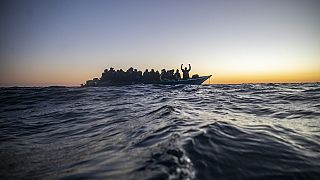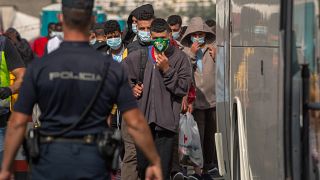African migrants
Mubarak Jaber, 23, from Sudan set off from Libya trying to reach Europe's shores in April.
But along with 100 other Africans he died in the worst migrant disaster this year after the vessel ran out of fuel and their calls for help to Italian, Maltese and Libyan authorities and later to Frontex, the European Union's border agency, went largely unanswered.
International maritime law dictates the migrants should have been saved.
An analysis of the logs and emails from Alarm Phone and the NGO SOS Mediterranée, as well as reports by the Libyan coast guard, show that the national authorities responded slowly, insufficiently, or not at all, to the pleas for help.
In all, approximately 130 people are believed to have died between 21 and 22 April as they waited in vain for someone to save them, roughly 45 kilometers (30 miles) from the Libyan coast.
Jaber, the eldest of seven brothers, had quit his economics studies at university and left Sudan looking for employment in neighboring Libya a year and a half earlier.
There he worked small jobs in construction to send money back to his relatives struggling in Sudan's deteriorating economic crisis.
But it still wasn't enough, so he contacted smugglers and boarded the ill-fated migrant boat, looking to head to Europe.
Jaber's cousin Adam Omer said: "The circumstances also after the revolution (Sudanese Revolution) became worse than before.
"The high cost of living, no employment, no jobs, he is the eldest of his brothers, he is working to help his brothers, this is why he emigrates to Libya and also he didn't find any suitable job there in Libya, that can make him assist his family here, this is what made him think to emigrate to Europe."
It was the deadliest wreck so far this year in the Mediterranean Sea, where more than 20,000 migrants or asylum seekers have perished since 2014, and has renewed accusations that European countries are failing to sufficiently help migrant boats in trouble.
Instead, human rights groups, the U.N.'s migration and refugee agencies and international law experts say they too often ignore their international obligations to rescue migrants at sea and outsource operations to the Libyan coast guard.
That's despite its limited capacity, reports of ties to human traffickers, and the fact that those intercepted, including children, are placed in squalid, overcrowded detention centers where they face abuse, torture, rape and even death.
European nations, of course, routinely rescue migrants in distress.
Since the 21 April wreck alone, the Italian coast guard and navy have rescued at least 149 people.
But no such rescue came on 21 April.
Jaber's father said: "I will speak to all of the youth, parents, brothers and every father that he should be keen on his son's life because if he (the son) travels that means he will cross the sea and put himself in danger, and make his father sad."













Go to video
Greece cracks down on irregular migration, says it’s "not an open corridor to Europe"
Go to video
Nearly 200 migrants intercepted off the coast of Senegal
00:42
EU says diplomatic incident with Libya "a protocol issue"
Go to video
More migrants arrive as Greece suspends asylum applications
01:27
More than 1,200 migrants arrive in Crete amid influx from Libya
01:24
EU to seek tougher measures from Libyan authorities on Mediterranean migrant sea crossings